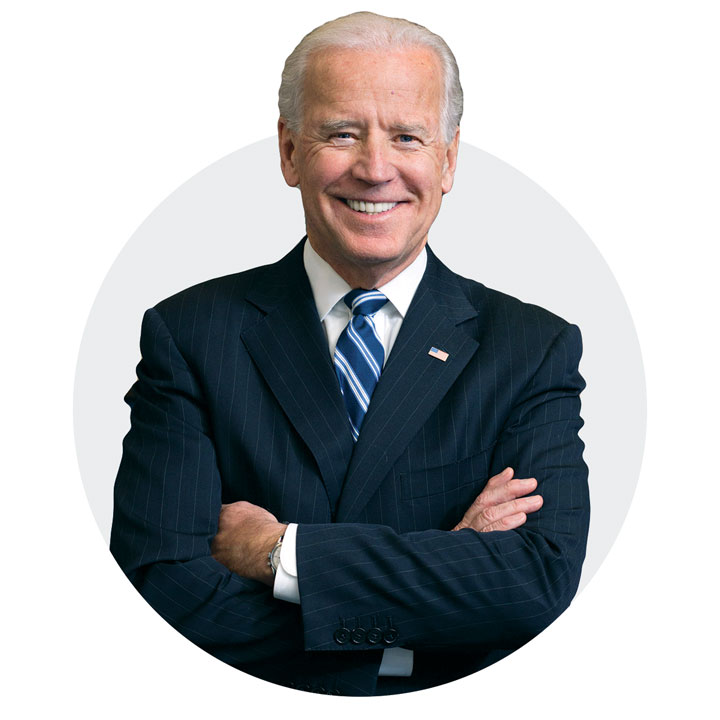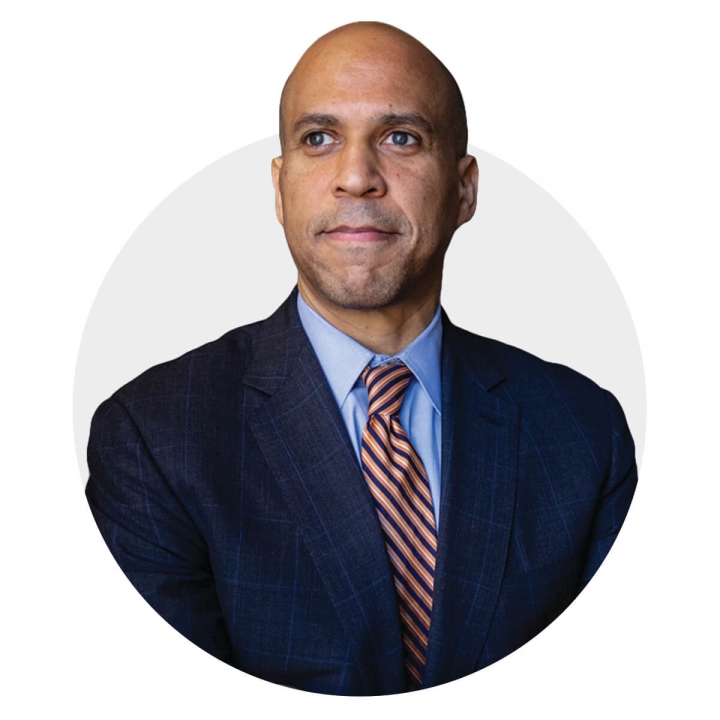Joe Biden on Criminal Justice Reform
Biden spearheaded the Comprehensive Control Act of 1984, which expanded federal drug trafficking penalties and civil asset forfeiture, without first proving a person is guilty of a crime.
Biden co-sponsored and co-authored the Anti-Drug Abuse Act of 198, which increased penalties for drug crimes, and most notably, created a large sentencing disparity between crack and powder cocaine.
Biden led the effort to pass the 1994 Violent Crime Control and Law Enforcement Act, which he in part authored. This law imposed harsher sentences and increased funding for prisons. States were able to receive funding for prisons if they passed “truth-in-sentencing” laws that required people convicted of crimes to serve at least 85% of their sentences. The law included the “Three Strikes” law, and provided federal funding for drug courts as part of diversion efforts. It also included other measures, such as the Violence Against Women Act that helped crack down on domestic violence and rape, a 10-year ban on assault weapons, funding for firearm background checks, and grant programs for local and state police. In 2016, after CNBC asked Biden if he was ashamed of the 1994 law, Biden responded, “Not at all. As a matter of fact, I drafted the bill, if you remember.” He acknowledged that there were parts of the law he’d change, but argued that “by and large what it really did, it restored American cities.”
Biden co-sponsored the Recidivism Reduction and Second Chance Act of 2007, which expanded services to offenders and their families for reentry into society.
Biden co-sponsored the Anti-Drug Abuse Act of 1988, which strengthened prison sentences for drug possession, enhanced penalties for transporting drugs, and established the Office of National Drug Control Policy.
Biden introduced the Drug Sentencing Reform and Cocaine Kingpin Trafficking Act of 2007, which would have eliminated the sentencing disparity between crack and powder cocaine, eliminated the five-year mandatory minimum prison term for first-time possession of crack cocaine, directed the Attorney General to increase grant funding for drug treatment in correctional facilities, and increase monetary penalties for drug trafficking. This bill never went up for a vote.
Today, Biden supports the full elimination of the crack and powder cocaine sentencing disparity.
Biden’s criminal justice plan for his campaign includes decriminalizing marijuana, eliminating mandatory minimum sentences for nonviolent crimes, ending the death penalty, abolishing private prisons, eliminating cash bail, and discouraging the incarceration of children.
“Today, too many people are incarcerated in the United States — and too many of them are black and brown. To build safe and healthy communities, we need to rethink who we’re sending to jail, how we treat those in jail, and how we help them get the health care, education, jobs, and housing they need to successfully rejoin society after they serve their time.”
Joe Biden Sets Goal Of Housing 100% Of The Formerly Incarcerated
HuffingtonPost, July 23, 2019 | Maxwell Strachan
“It was a big mistake when it was made. We thought, we were told by the experts, that crack — you never go back; it was somehow fundamentally different. It’s not different, but it’s trapped an entire generation… [I] may not have always gotten things right.”
Biden: ‘I haven’t always been right’ on criminal justice
CNN, January 21, 2019 | Arlette Saenz
“I got stuck with, because I was chairman of the [Senate] Judiciary Committee, writing most of the drug legislation that occurred in [the 1980s and ’90s]… Big mistake was us buying into the idea that crack cocaine was different than powdered cocaine and having [different] penalties.” Speaking at the University of Pennsylvania on April 11, 2019 as part of a panel on the opioid crisis.
How Joe Biden’s Policies Made the Opioid Crisis Harder to Treat
Politico, May 23, 2019 | Zachary Siegel
Read More
Joe Biden’s tough-on-crime past could haunt him in 2020
Washington Post, January 23, 2019 | Eugene Scott
Joe Biden’s long record supporting the war on drugs and mass incarceration, explained
Vice, July 31, 2019 | German Lopez
Trump’s Crime Bill attacks on Joe Biden ignore his own harsh response to criminal activity
The Washington Post, May 28, 2019
Eugene Scott
The Biden Plan for Strengthening America’s Commitment to Justice
Joe Biden campaign website | 2019
Joe Biden on Overdose Prevention Sites
Biden wrote the Anti-Drug Abuse Act of 1986, which included the 1986 Emergency Crack Control Act, commonly referred to as “the crack house statute”. This bill was intended to give police and prosecutors a way to criminalize landlords who allowed open drug use and sales, and makes it a federal crime to “knowingly open, lease, rent, use or maintain any place, whether permanently or temporarily, for the purpose of manufacturing, distributing or using any controlled substance.” President Trump’s attorney general William McSwain is now using this statute to attempt to block efforts in Philadelphia, PA to open the first U.S. supervised injection site.
Read More
Trump Administration Is In Court To Block Nation’s 1st Supervised Injection Site
NPR, September 6, 2019 | Nina Feldman
Joe Biden on Naloxone Access
Biden has not issued specific statements to this issue.
Joe Biden on HIV Getting to Zero
Biden has not issued specific statements to this issue
Biden has not completed a survey about HIV policy issued by AIDS United.
2020 Presidential Candidate HIV Questionnaire
AIDS United, 2019
Read More
2020 Presidential Candidate HIV Questionnaire
AIDS United, 2019
Cory Booker Explains His HIV Policy Ideas
HIV+Magazine, September 9, 2019 | Jacob Anderson-Minshall
Joe Biden on Hepatitis C Treatment Access
Biden has not issued specific statements to this issue.
Joe Biden on Voting Rights Restoration
Biden has not issued specific statements to this issue.
“You’ve got Jim Crow sneaking back in,” he said, “You know what happens when you have an equal right to vote? They lose.”
Biden says ‘we’ve got Jim Crow sneaking back in’ thanks to Trump and Republicans
Business Insider, May 4, 2019 | Michelle Mark
Read More
How Joe Biden’s Policies Made the Opioid Crisis Harder to Treat
Politico, May 23, 2019 | Zachary Siegel
Joe Biden on Substance Use Treatment Access
Biden campaign spokesman Andrew Bates referred to Biden’s work on the Affordable Care Act’s Medicaid expansion, “the single biggest step ever taken to address the opioid epidemic and the backbone of addiction treatment in America.”
“Expand federal funding for mental health and substance use disorder services and research. People experiencing mental health and substance use disorders should have access to affordable quality care long before their situations escalate and they interact with the criminal justice system. …Expand health insurance coverage so more Americans have access to treatment, …(and) double the number of … health professional in our schools so our kids get the mental health care they need.”
The Biden Plan for Strengthening America’s Commitment to Justice
Joe Biden campaign website | 2019
“Get people who should be supported with social services – instead of in our prisons – connected to the help they need. …partner mental health and substance use disorder experts, social workers and disability advocates with police departments…these service providers will respond to calls with police officers so individuals who should not be in the criminal justice system are diverted to treatment for addiction or mental health problems, or provided social services they may need.”
The Biden Plan for Strengthening America’s Commitment to Justice
Joe Biden campaign website | 2019
Read More
The Biden Plan for Strengthening America’s Commitment to Justice
Joe Biden campaign website | 2019
The Biden Plan for Strengthening America’s Commitment to Justice
Joe Biden campaign website | 2019
How Joe Biden’s Policies Made the Opioid Crisis Harder to Treat
Politico, May 23, 2019 | Zachary Siegel
Joe Biden on Syringe Access
Biden has not issued specific statements to this issue
Cory Booker on Naloxone
Booker signed onto 2017 letter to President Trump, asking him to follow the recommendations of his Commission on Combating Drug Addiction and the Opioid Crisis and allow the government to negotiate lower prices for naloxone.
Booker is one of the signers to a 2018 letter to the HHS director asking for immediate action to reduce the price of naloxone.
From the 2018 letter to the HHS director, sent by 17 senators: “No police officer, no firefighter, no public health provider, and no person should be unable to save a life because of the high price,” the lawmakers wrote.“By bringing down the cost, we can get this life-saving drug in the hands of more people as called for by the Surgeon General. Doing so will save countless lives.”
Klobuchar, Smith, Senators Call on Administration to Take Immediate Action to Reduce Price of Naloxone, a Life-Saving Opioid Overdose Reversal Drug
Klobuchar Senate Website, April 30, 2018
Read More
Klobuchar, Smith, Senators Call on Administration to Take Immediate Action to Reduce Price of Naloxone, a Life-Saving Opioid Overdose Reversal Drug
Klobuchar Senate Website, April 30, 2018
Blumenthal, Murphy Call on President To Allow Government to Negotiate Lower Prices for Naloxone, a Life-Saving Opioid Overdose Reversal Drug
Office of Senator Richard Blumenthal, October 25, 2017
Joe Biden on Drug Decriminalization
Biden’s 2019 platform calls for decriminalizing cannabis and expunging all prior cannabis use convictions. Biden would reschedule cannabis as a schedule II drug so researchers can study its impacts.
Biden's 2019 platform calls for decriminalizing cannabis and expunging all prior cannabis use convictions. Reschedule cannabis as a schedule II drug so researchers can study its impacts.
Biden authored the Reducing Americans’ Vulnerability to Ecstasy (RAVE) Act, which expanded the provision to allow prosecutors to pursue the operators of warehouses or fields where music festivals are held in an attempt to penalize MDMA use. The bill was signed into law in 2003 as part of the PROTECT Act.
Biden would allow states to legalize recreational marijuana.
Biden would legalize medical marijuana.
Biden co-authored the “Len Bias Law,” which intended to enhance the sentences faced by major drug traffickers and distributors. This law has since been used to prosecute individuals for drug-induced homicide.
At a town hall event in Las Vegas, Nevada on November 16, 2019, Biden expressed that he would need further evidence that marijuana is not a gateway drug to other substances before considering federal legalization of marijuana.
“Number one, I think we should decriminalize marijuana period. And I think anyone who has a record should be let out of jail, their records expunged, it be completely zeroed out. But, I do think it makes sense, based on data, that we should study what the long term effects are for the use of marijuana. That’s all it is. Number one, everyone gets out, records expunged.”
“The truth of the matter is, there’s not nearly been enough evidence that has been acquired as to whether or not it [marijuana] is a gateway drug. It’s a debate, and I want a lot more before I legalize it nationally. I want to make sure we know a lot more about the science behind it… It is not irrational to do more scientific investigation to determine, which we have not done significantly enough, whether or not there are any things that relate to whether it’s a gateway drug or not”
Joe Biden is still questioning if marijuana is a gateway drug, even though research doesn’t support the idea
Business Insider, November 17, 2019 | Ellen Cranley
“No one should be imprisoned for the use of illegal drugs alone. Instead, they should be diverted to drug courts and treatment.”
The Biden Plan for Strengthening America’s Commitment to Justice
Joe Biden campaign website, 2019
“Quite frankly, the president’s plan is not tough enough…The president said he wants to wage a war on drugs. But if that’s true, what we need is another D-Day, not another Vietnam; not another limited war fought on the cheap and destined for stalemate and human tragedy.” 1989 response to President George H.W. Bush’s special White House address
Democrats Are Racing to Look Progressive on Drugs
Vice, August 30, 2019 | Maia Szalavitz
“If I were governor of my state or mayor of my town, I would be passing new ordinances relating to stiff criminal penalties for anyone who held a rave. The promoter, the guy who owned the building, I’d put the son of a gun in jail!”
On King Holiday, Democrats Convey Hope, Remorse and Invective Against Trump
The New York Times, January 21, 2019 | Astead W. Herndon and Jonathan Martin
“Now I’m going to point out some specific things, six of them, that we find inadequate about the President’s plan. I think the President [Bush] has to join us in making a significantly greater commitment to these six areas to stem the rising tide of violence in America. And that’s what it is – violence. First we have to join together and ensure that drug dealers are punished – surely, swiftly, and severely. In align what the president is calling for, we have to hold every drug user accountable, because if there are no drug users, there would be no appetite for drugs. There would be no market for them. Let’s take a look at what the real problem is. It’s not just how many people are using drugs. As the President said, the number of people using drugs, cocaine in particular, is down in our country. That’s true, but the violence associated with drugs is spewing out all over America, and that’s terrible. I know its hard to believe, but this very day, violent drug offenders will commit more than 100,000 crimes, on this day alone. And the sad part is that we have no more police in the streets of our major cities than we had 10 years ago. And what the President proposes won’t help much… In a nutshell, what the President’s plan doesn’t include enough police officers to catch the violent thugs, not enough prosecutors to convict them, not enough judges to sentence them, and not enough prison cells to put them away for a long time…. That’s why we think the President should triple, triple the commitment he’s made tonight for police, prosecutors, and judges for our cities and our states.”
Democratic Anti-Drug Legislation
C-Span, July 31, 1989
“It was a big mistake when it was made. We thought, we were told by the experts, that crack — you never go back; it was somehow fundamentally different. It’s not different, but it’s trapped an entire generation… [I] may not have always gotten things right.” – At a January, 2019 breakfast commemorating Martin Luther King Jr. in reference to the 1988 legislation.
On King Holiday, Democrats Convey Hope, Remorse and Invective Against Trump
The New York Times, January 21, 2019 | Astead W. Herndon and Jonathan Martin
Read More
Booker to Biden on not legalizing marijuana: ‘I thought you might have been high’
MSNBC, November 20, 2019
Joe Biden’s long record supporting the war on drugs and mass incarceration, explained
Vice, July 31, 2019 | German Lopez
Joe Biden’s ‘Crack House’ Crusade
The Appeal, September 11, 2019 | Zachary A. Siegel








